100句地道中文的地道英语翻译
- 格式:doc
- 大小:51.50 KB
- 文档页数:11
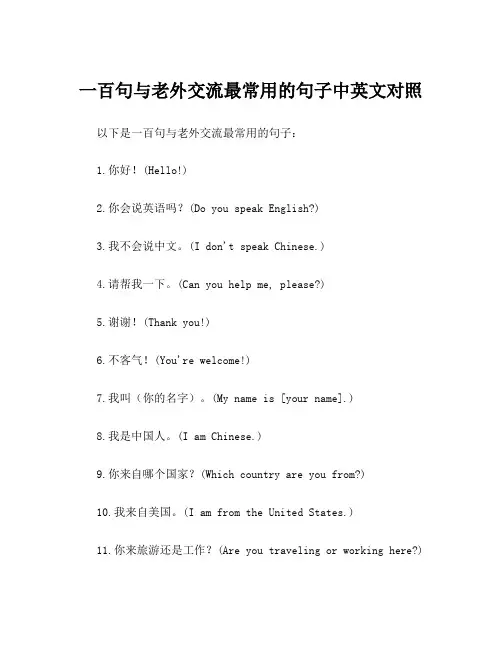
一百句与老外交流最常用的句子中英文对照以下是一百句与老外交流最常用的句子:1.你好!(Hello!)2.你会说英语吗?(Do you speak English?)3.我不会说中文。
(I don't speak Chinese.)4.请帮我一下。
(Can you help me, please?)5.谢谢!(Thank you!)6.不客气!(You're welcome!)7.我叫(你的名字)。
(My name is [your name].)8.我是中国人。
(I am Chinese.)9.你来自哪个国家?(Which country are you from?)10.我来自美国。
(I am from the United States.)11.你来旅游还是工作?(Are you traveling or working here?)12.我在这里工作。
(I am working here.)13.你喜欢中国的文化吗?(Do you like Chinese culture?)14.是的,我很喜欢。
(Yes, I really like it.)15.请问,这附近有好的餐厅吗?(Excuse me, are there any good restaurants nearby?)16.你有什么推荐?(Do you have any recommendations?)17.这里有什么好玩的地方?(What are some fun places to visit here?)18.我可以去哪里购物?(Where can I go shopping?)19.请告诉我怎么去(地点)。
(Please tell me how to get to [location].)20.麻烦给我一个地图。
(Could you give me a map, please?)21.我迷路了。
(I'm lost.)22.对不起,我听不懂。
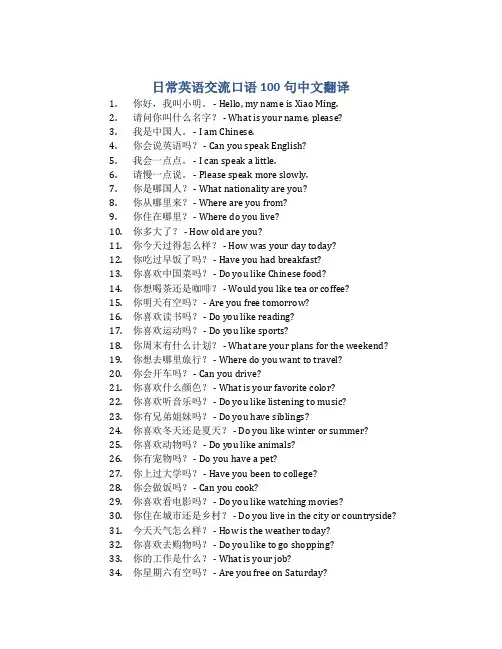
日常英语交流口语100句中文翻译1.你好,我叫小明。
- Hello, my name is Xiao Ming.2.请问你叫什么名字? - What is your name, please?3.我是中国人。
- I am Chinese.4.你会说英语吗? - Can you speak English?5.我会一点点。
- I can speak a little.6.请慢一点说。
- Please speak more slowly.7.你是哪国人? - What nationality are you?8.你从哪里来? - Where are you from?9.你住在哪里? - Where do you live?10.你多大了? - How old are you?11.你今天过得怎么样? - How was your day today?12.你吃过早饭了吗? - Have you had breakfast?13.你喜欢中国菜吗? - Do you like Chinese food?14.你想喝茶还是咖啡? - Would you like tea or coffee?15.你明天有空吗? - Are you free tomorrow?16.你喜欢读书吗? - Do you like reading?17.你喜欢运动吗? - Do you like sports?18.你周末有什么计划? - What are your plans for the weekend?19.你想去哪里旅行? - Where do you want to travel?20.你会开车吗? - Can you drive?21.你喜欢什么颜色? - What is your favorite color?22.你喜欢听音乐吗? - Do you like listening to music?23.你有兄弟姐妹吗? - Do you have siblings?24.你喜欢冬天还是夏天? - Do you like winter or summer?25.你喜欢动物吗? - Do you like animals?26.你有宠物吗? - Do you have a pet?27.你上过大学吗? - Have you been to college?28.你会做饭吗? - Can you cook?29.你喜欢看电影吗? - Do you like watching movies?30.你住在城市还是乡村? - Do you live in the city or countryside?31.今天天气怎么样? - How is the weather today?32.你喜欢去购物吗? - Do you like to go shopping?33.你的工作是什么? - What is your job?34.你星期六有空吗? - Are you free on Saturday?35.你喜欢喝啤酒吗? - Do you like to drink beer?36.你喜欢喝茶呢还是咖啡? - Do you prefer tea or coffee?37.你爱吃巧克力吗? - Do you love to eat chocolate?38.你今天心情怎么样? - How are you feeling today?39.你的朋友喜欢运动吗? - Do your friends like sports?40.你想去旅行吗? - Do you want to travel?41.你喜欢看书吗? - Do you like reading books?42.你今晚过得如何? - How was your evening?43.你喜欢喝咖啡吗? - Do you like to drink coffee?44.你明天有什么计划? - What are your plans for tomorrow?45.你想去看电影吗? - Do you want to go watch a movie?46.你会游泳吗? - Can you swim?47.你喜欢吃西餐还是中餐? - Do you prefer Western or Chinese food?48.你家有几口人? - How many people are in your family?49.你的生日是几月几日? - What is your birthday?50.你会弹吉他吗? - Can you play the guitar?51.你星期天有空吗? - Are you free on Sunday?52.你喜欢去海边吗? - Do you like to go to the beach?53.你喜欢喝果汁吗? - Do you like to drink juice?54.你的假期计划是什么? - What are your holiday plans?55.你喜欢看足球比赛吗? - Do you like watching football matches?56.你会滑雪吗? - Can you ski?57.你上班要坐公交车吗? - Do you take a bus to work?58.你愿意跟我一起去看电影吗? - Would you like to go watch a movie with me?59.你想喝茶还是咖啡? - Would you like tea or coffee?60.你周末喜欢做什么? - What do you like to do on weekends?61.你刚才在干什么? - What were you doing just now?62.你喜欢在家还是外面吃饭? - Do you like to eat at home or outside?63.你今天有什么计划? - What are your plans for today?64.你工作很忙吗? - Are you busy with your work?65.你愿意和我一起去跑步吗? - Would you like to go running with me?66.你在这里工作多久了? - How long have you been working here?67.你星期一有空吗? - Are you free on Monday?68.你星期三有什么安排? - What are your plans for Wednesday?69.你住在哪个城市? - In which city do you live?70.你想喝热巧克力还是冰巧克力? - Do you want hot chocolate or iced chocolate?71.你喜欢去野餐吗? - Do you like to go for a picnic?72.你今天打算做什么? - What do you plan to do today?73.你多长时间回家一次? - How often do you go home?74.你愿意和我一起参加派对吗? - Would you like to join the party with me?75.你的家乡是一个大城市吗? - Is your hometown a big city?76.你住在城市中心还是郊区? - Do you live in the city center or suburbs?77.你们家有车吗? - Does your family have a car?78.你想买一件什么衣服? - What kind of clothes do you want to buy?79.你希望更多时间陪家人吗? - Do you wish for more time with family?80.你习惯早起吗? - Are you used to getting up early?81.你的朋友喜欢喝酒吗? - Do your friends like to drink?82.你想出国留学吗? - Do you want to study abroad?83.你每天都做运动吗? - Do you exercise every day?84.你今天下午有什么计划? - What are your plans for this afternoon?85.你喜欢喝饮料还是牛奶? - Do you prefer drinks or milk?86.你的手机是哪个牌子的? - Which brand is your phone?87.你喜欢看电视剧吗? - Do you like to watch TV dramas?88.你会弹钢琴吗? - Can you play the piano?89.你妈妈是做什么工作的? - What does your mom do for work?90.你有兴趣学习新技能吗? - Are you interested in learning new skills?91.你想尝试一些新的餐馆吗? - Do you want to try some new restaurants?92.你最喜欢哪个季节? - Which season do you like the most?93.你愿意尝试一些新的运动吗? - Would you be willing to try some new sports?94.你的家乡是一个热闹的地方吗? - Is your hometown a lively place?95.你住在学校宿舍吗? - Do you live in a school dormitory?96.你通常在周末做什么? - What do you usually do on weekends?97.你帮家里做家务吗? - Do you help with household chores at home?98.你喜欢旅行还是呆在家里? - Do you like to travel or stay at home?99.你喜欢参加聚会吗? - Do you like to attend parties?100.你觉得现在怎么样? - How do you feel right now?以上是日常英语交流口语100句中文翻译,希望对你有所帮助。
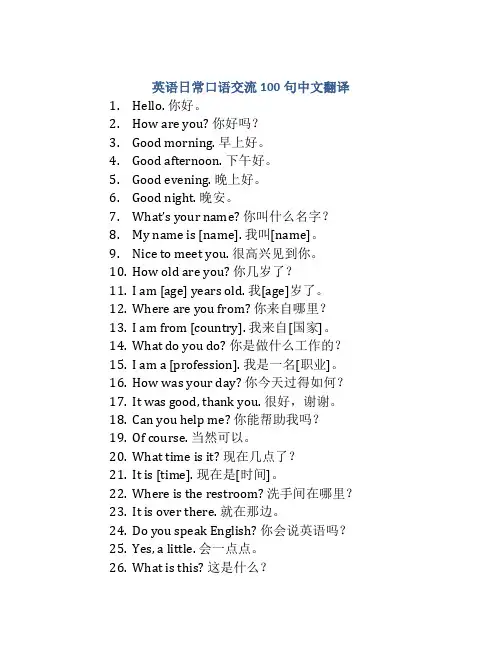
英语日常口语交流100句中文翻译1.Hello. 你好。
2.How are you? 你好吗?3.Good morning. 早上好。
4.Good afternoon. 下午好。
5.Good evening. 晚上好。
6.Good night. 晚安。
7.What’s your name? 你叫什么名字?8.My name is [name]. 我叫[name]。
9.Nice to meet you. 很高兴见到你。
10.How old are you? 你几岁了?11.I am [age] years old. 我[age]岁了。
12.Where are you from? 你来自哪里?13.I am from [country]. 我来自[国家]。
14.What do you do? 你是做什么工作的?15.I am a [profession]. 我是一名[职业]。
16.How was your day? 你今天过得如何?17.It was good, thank you. 很好,谢谢。
18.Can you help me? 你能帮助我吗?19.Of course. 当然可以。
20.What time is it? 现在几点了?21.It is [time]. 现在是[时间]。
22.Where is the restroom? 洗手间在哪里?23.It is over there. 就在那边。
24.Do you speak English? 你会说英语吗?25.Yes, a little. 会一点点。
26.What is this? 这是什么?27.This is a [object]. 这是一个[物品]。
28.How much does it cost? 这个多少钱?29.It is [price]. 是[价格]。
30.I don’t understand. 我不明白。
31.Can you repeat that? 你能重复一遍吗?32.I need help. 我需要帮助。
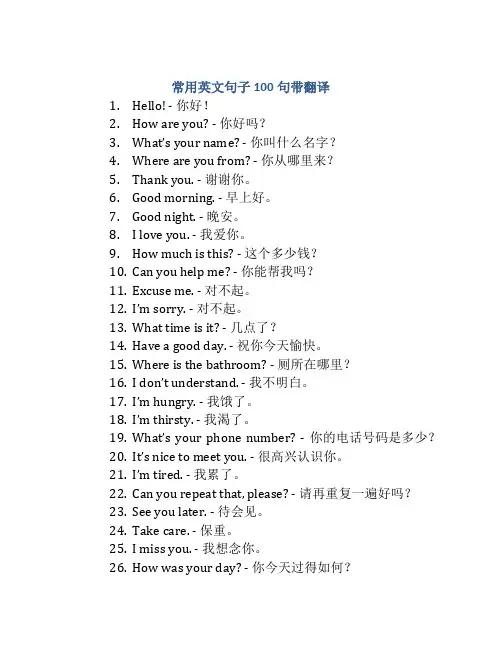
常用英文句子100句带翻译1.Hello! - 你好!2.How are you? - 你好吗?3.What’s your name? - 你叫什么名字?4.Where are you from? - 你从哪里来?5.Thank you. - 谢谢你。
6.Good morning. - 早上好。
7.Good night. - 晚安。
8.I love you. - 我爱你。
9.How much is this? - 这个多少钱?10.Can you help me? - 你能帮我吗?11.Excuse me. - 对不起。
12.I’m sorry. - 对不起。
13.What time is it? - 几点了?14.Have a good day. - 祝你今天愉快。
15.Where is the bathroom? - 厕所在哪里?16.I don’t understand. - 我不明白。
17.I’m hungry. - 我饿了。
18.I’m thirsty. - 我渴了。
19.What’s your phone number? - 你的电话号码是多少?20.It’s nice to meet you. - 很高兴认识你。
21.I’m tired. - 我累了。
22.Can you repeat that, please? - 请再重复一遍好吗?23.See you later. - 待会见。
24.Take care. - 保重。
25.I miss you. - 我想念你。
26.How was your day? - 你今天过得如何?27.What do you do for a living? - 你是做什么工作的?28.Do you speak English? - 你会说英语吗?29.I’m bored. - 我无聊。
30.Let’s go out. - 我们出去吧。
31.I’m so happy. - 我很开心。
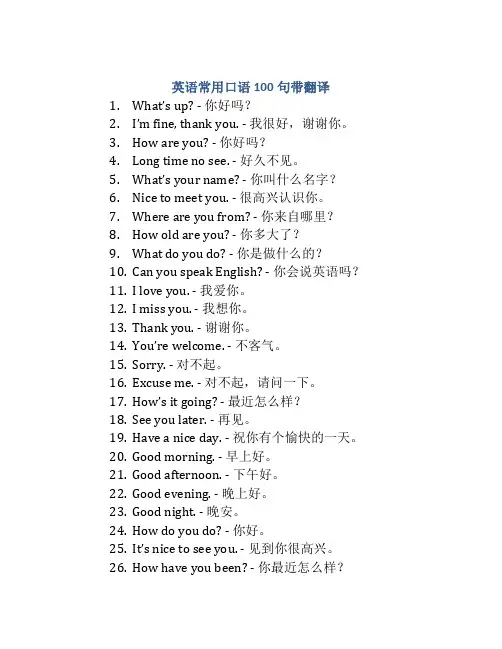
英语常用口语100句带翻译1.What’s up? - 你好吗?2.I’m fine, thank you. - 我很好,谢谢你。
3.How are you? - 你好吗?4.Long time no see. - 好久不见。
5.What’s your name? - 你叫什么名字?6.Nice to meet you. - 很高兴认识你。
7.Where are you from? - 你来自哪里?8.How old are you? - 你多大了?9.What do you do? - 你是做什么的?10.Can you speak English? - 你会说英语吗?11.I love you. - 我爱你。
12.I miss you. - 我想你。
13.Thank you. - 谢谢你。
14.You’re welcome. - 不客气。
15.Sorry. - 对不起。
16.Excuse me. - 对不起,请问一下。
17.How’s it going? - 最近怎么样?18.See you later. - 再见。
19.Have a nice day. - 祝你有个愉快的一天。
20.Good morning. - 早上好。
21.Good afternoon. - 下午好。
22.Good evening. - 晚上好。
23.Good night. - 晚安。
24.How do you do? - 你好。
25.It’s nice to see you. - 见到你很高兴。
26.How have you been? - 你最近怎么样?27.Let me introduce myself. - 让我来介绍一下自己。
28.Can you help me? - 你可以帮我吗?29.Where is the restroom? - 洗手间在哪里?30.I’m sorry, I don’t understand. - 抱歉,我不明白。
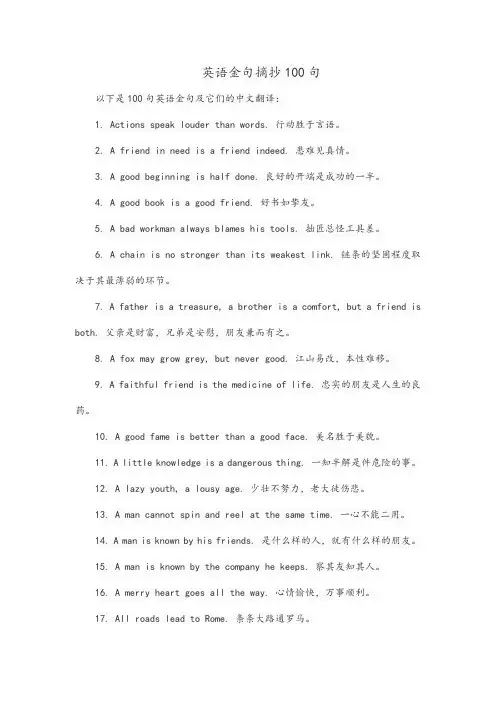
英语金句摘抄100句以下是100句英语金句及它们的中文翻译:1. Actions speak louder than words. 行动胜于言语。
2. A friend in need is a friend indeed. 患难见真情。
3. A good beginning is half done. 良好的开端是成功的一半。
4. A good book is a good friend. 好书如挚友。
5. A bad workman always blames his tools. 拙匠总怪工具差。
6. A chain is no stronger than its weakest link. 链条的坚固程度取决于其最薄弱的环节。
7. A father is a treasure, a brother is a comfort, but a friend is both. 父亲是财富,兄弟是安慰,朋友兼而有之。
8. A fox may grow grey, but never good. 江山易改,本性难移。
9. A faithful friend is the medicine of life. 忠实的朋友是人生的良药。
10. A good fame is better than a good face. 美名胜于美貌。
11. A little knowledge is a dangerous thing. 一知半解是件危险的事。
12. A lazy youth, a lousy age. 少壮不努力,老大徒伤悲。
13. A man cannot spin and reel at the same time. 一心不能二用。
14. A man is known by his friends. 是什么样的人,就有什么样的朋友。
15. A man is known by the company he keeps. 察其友知其人。
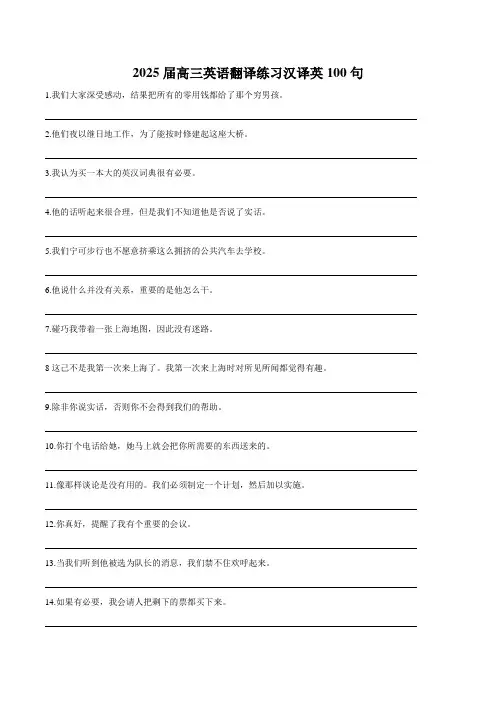
2025届高三英语翻译练习汉译英100句1.我们大家深受感动,结果把所有的零用钱都给了那个穷男孩。
2.他们夜以继日地工作,为了能按时修建起这座大桥。
3.我认为买一本大的英汉词典很有必要。
4.他的话听起来很合理,但是我们不知道他是否说了实话。
5.我们宁可步行也不愿意挤乘这么拥挤的公共汽车去学校。
6.他说什么并没有关系,重要的是他怎么干。
7.碰巧我带着一张上海地图,因此没有迷路。
8这己不是我第一次来上海了。
我第一次来上海时对所见所闻都觉得有趣。
9.除非你说实话,否则你不会得到我们的帮助。
10.你打个电话给她,她马上就会把你所需要的东西送来的。
11.像那样谈论是没有用的。
我们必须制定一个计划,然后加以实施。
12.你真好,提醒了我有个重要的会议。
13.当我们听到他被选为队长的消息,我们禁不住欢呼起来。
14.如果有必要,我会请人把剩下的票都买下来。
15.只要你让我管这个孩子,我就会让他用功。
16.任何不守规则的人都要受到惩罚。
17.他们一定挺忙的,因为他们必须准备考试。
18.你一定丢失了什么东西,不然不会看起来这么焦虑。
19.据报道,那个国家的军队正在攻击其邻国。
20.你真幸运,你的数学老师被认为是全校最好的老师。
21.直到所有的病人都得到了治疗,医生才离开他的办公室。
22.随着上海的发展,上海人民的生活条件已大为改善。
23.有老师们的帮助和鼓励,学生们的进步越来越大。
24.我从未看到过这么激动人心的足球赛,它比我想象的精彩得多。
25.只有当你理解领会了这种知识,才能把它记住。
26.他们来上海已经一个半月了,但至今还未找到工作。
27.过了一个月他才回家,结果他的叔父已经离开了。
28.请把书刊放回原处。
29.“有志者事竟成”这是一条常见的英语谚语。
30.我们除了等待进一步的消息外什么也干不了,尽管我们并不愿意那么做。
31.但愿我能给你一点帮助,但事实上我自己也只能依靠别人。
32.如果你坚持要我一个人去,我愿惹服从你的命令。
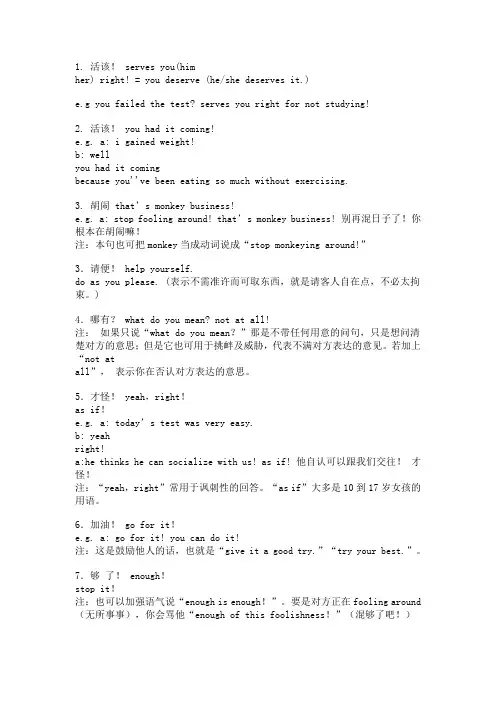
1. 活该! serves you(himher) right! = you deserve (he/she deserves it.)e.g you failed the test? serves you right for not studying!2. 活该! you had it coming!e.g. a: i gained weight!b: wellyou had it comingbecause you''ve been eating so much without exercising.3. 胡闹that’s monkey business!e.g. a: stop fooling around! that’s monkey business! 别再混日子了!你根本在胡闹嘛!注:本句也可把monkey当成动词说成“stop monkeying around!”3.请便! help yourself.do as you please. (表示不需准许而可取东西,就是请客人自在点,不必太拘束。
)4.哪有? what do you mean? not at all!注:如果只说“what do you mean?”那是不带任何用意的问句,只是想问清楚对方的意思;但是它也可用于挑衅及威胁,代表不满对方表达的意见。
若加上“not atall”,表示你在否认对方表达的意思。
5.才怪! yeah,right!as if!e.g. a: today’s test was very easy.b: yeahright!a:he thinks he can socialize with us! as if! 他自认可以跟我们交往!才怪!注:“yeah,right”常用于讽刺性的回答。
“as if”大多是10到17岁女孩的用语。
6.加油! go for it!e.g. a: go for it! you can do it!注:这是鼓励他人的话,也就是“give it a good try.”“try your best.”。

英语句子摘抄初一含中文100句引言学习英语是初中生的必修课程之一,英语句子的学习是培养语感和提高语言表达能力的重要环节。
本文将为读者摘抄100句初一阶段的英语句子,并附有中文翻译,帮助读者理解和掌握这些句子的用法和意义。
句子列表1.Be yourself, everyone else is taken. (做你自己,其他人都已经存在了。
)2.Actions speak louder than words. (行动胜于言辞。
)3.All you need is love. (你所需要的只是爱。
)4.Don’t dream your life, live your dream. (不要做梦想人生,努力活出你的梦想。
)5.Believe in yourself. (相信自己。
)6.Strive for progress, not perfection. (追求进步,而非完美。
)7.Life is what happens when you’re busy making other plans. (生活就是发生在你忙于制定其他计划的时候。
)8.The only way to do great work is to love what you do. (做出杰出的工作的唯一途径是热爱你所做的。
)9.Don’t wait. The time will never be just right. (不要等待,适合的时机永远不会到来。
)10.In the middle of difficulty lies opportunity. (困境中蕴藏着机会。
)11.The best way to predict your future is to create it. (预测未来的最好方法是创造未来。
)12.Success is not the key to happiness. Happiness is the key to success.(成功并不是幸福的关键,幸福才是成功的关键。
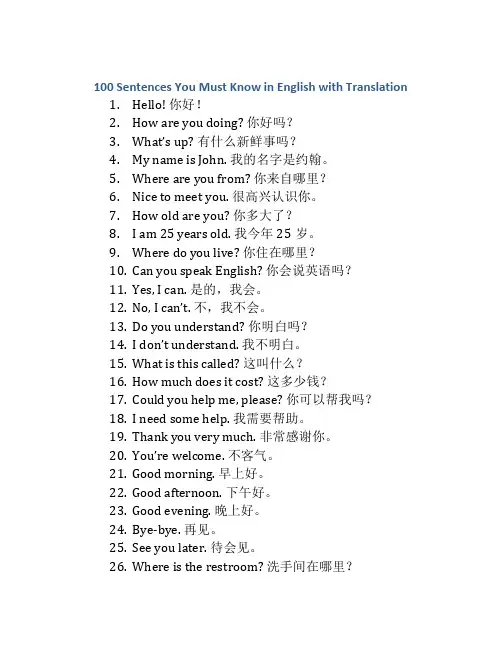
100 Sentences You Must Know in English with Translation1.Hello! 你好!2.How are you doing? 你好吗?3.What’s up? 有什么新鲜事吗?4.My name is John. 我的名字是约翰。
5.Where are you from? 你来自哪里?6.Nice to meet you. 很高兴认识你。
7.How old are you? 你多大了?8.I am 25 years old. 我今年25岁。
9.Where do you live? 你住在哪里?10.Can you speak English? 你会说英语吗?11.Yes, I can. 是的,我会。
12.No, I can’t. 不,我不会。
13.Do you understand? 你明白吗?14.I don’t understand. 我不明白。
15.What is this called? 这叫什么?16.How much does it cost? 这多少钱?17.Could you help me, please? 你可以帮我吗?18.I need some help. 我需要帮助。
19.Thank you very much. 非常感谢你。
20.You’re welcome. 不客气。
21.Good morning. 早上好。
22.Good afternoon. 下午好。
23.Good evening. 晚上好。
24.Bye-bye. 再见。
25.See you later. 待会见。
26.Where is the restroom? 洗手间在哪里?27.I am hungry. 我饿了。
28.I am thirsty. 我渴了。
29.Can I have the bill, please? 请给我账单。
30.What time is it? 几点了?31.Do you have the time? 你知道时间吗?32.How was your day? 你今天过得怎么样?33.It’s a beautiful day. 今天天气真不错。
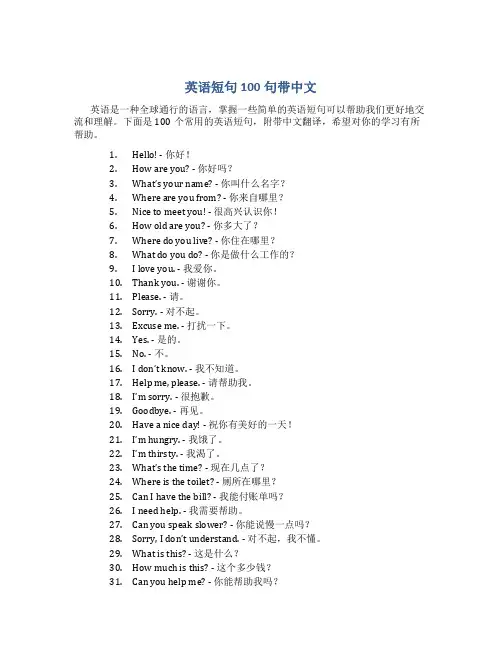
英语短句100句带中文英语是一种全球通行的语言,掌握一些简单的英语短句可以帮助我们更好地交流和理解。
下面是100个常用的英语短句,附带中文翻译,希望对你的学习有所帮助。
1.Hello! - 你好!2.How are you? - 你好吗?3.What’s your name? - 你叫什么名字?4.Where are you from? - 你来自哪里?5.Nice to meet you! - 很高兴认识你!6.How old are you? - 你多大了?7.Where do you live? - 你住在哪里?8.What do you do? - 你是做什么工作的?9.I love you. - 我爱你。
10.Thank you. - 谢谢你。
11.Please. - 请。
12.Sorry. - 对不起。
13.Excuse me. - 打扰一下。
14.Yes. - 是的。
15.No. - 不。
16.I don’t know. - 我不知道。
17.Help me, please. - 请帮助我。
18.I’m sorry. - 很抱歉。
19.Goodbye. - 再见。
20.Have a nice day! - 祝你有美好的一天!21.I’m hungry. - 我饿了。
22.I’m thirsty. - 我渴了。
23.What’s the time? - 现在几点了?24.Where is the toilet? - 厕所在哪里?25.Can I have the bill? - 我能付账单吗?26.I need help. - 我需要帮助。
27.Can you speak slower? - 你能说慢一点吗?28.Sorry, I don’t understand. - 对不起,我不懂。
29.What is this? - 这是什么?30.How much is this? - 这个多少钱?31.Can you help me? - 你能帮助我吗?33.Be careful! - 小心!34.It’s beautiful. - 真漂亮。
501.身在福中不知福。
Take it for granted.E.g. A: Y ou should appreciate the fact that you have parents who love you. Don’t take it for granted.502. 嗨!我们又见面了。
Heywe meet again!8 字篇503.有本事你做给我看!Let’s see you do it!(语气多半是不高兴的,故会在you加重语气)504.你没别的事好做吗?Don’t you have anything better to do?(本句有要对方离自己远一点的意思)505.你先走,我随后就到。
Y ou go first. I’ll catch up later.506.你想到哪里去了啊?What are you thinking?注:说这句话带有生气的语调,可在what,thinking上面加重语气。
507.我的意思不是那样!That’s not what I’m saying!注:这句话也可说成“That’s not what I mean.”508.你这话是什么意思?What do you mean by that?注:这句话表示对方说的话有言外之意,因而对此感到不悦。
509.这种事谁也说不准。
Y ou can never tell about this sort of thing.510. 让我一个人静一静。
Leave me be.注:本句跟“Leave me alone.”“I want to be alone.”意思一样。
而看到这种情形,通常会问“Wanna talk?”,就是“Do you want to talk?”的口语用法。
511.睁一只眼,闭一只眼。
I’ll pretend I didn’t see that.注:表示装作不知道这件事。
512.放一百二十个心吧。
Relax. Y ou can count on me.注:这句话表示会极力帮忙,请对方放心。
英语短句100句带翻译学习外语的过程中,熟练掌握常用的短句可以帮助我们更好地交流和表达自己的思想。
下面是100个常用的英语短句及其翻译,希望对大家的学习有所帮助。
1.Hello! - 你好!2.How are you? - 你好吗?3.I’m fine, thank you. - 我很好,谢谢你。
4.What’s your name? - 你叫什么名字?5.Nice to meet you. - 很高兴认识你。
6.Where are you from? - 你来自哪里?7.I’m from China. - 我来自中国。
8.How old are you? - 你多大了?9.I am 25 years old. - 我25岁。
10.What do you do? - 你是做什么的?11.I am a teacher. - 我是一名老师。
12.Where do you live? - 你住在哪里?13.I live in Beijing. - 我住在北京。
14.What’s your favorite color? - 你最喜欢的颜色是什么?15.My favorite color is blue. - 我最喜欢的颜色是蓝色。
16.What’s your hobby? - 你的爱好是什么?17.My hobby is reading. - 我的爱好是阅读。
18.Can you speak English? - 你会说英语吗?19.Yes, I can speak English. - 是的,我会说英语。
20.Thank you. - 谢谢你。
21.You’re welcome. - 不用谢。
22.Excuse me. - 对不起。
23.I’m sorry. - 对不起。
24.Please. - 请。
25.May I ask a question? - 我可以问个问题吗?26.Of course. - 当然可以。
英语100句优美句⼦加中⽂1. 提供100句英⽂美句,带翻译Pain past is pleasure.(过去的痛苦就是快乐。
)[⽆论多么艰难⼀定要咬⽛冲过去,将来回忆起来⼀定甜蜜⽆⽐。
] 2. While there is life, there is hope.(有⽣命就有希望/留得青⼭在,不怕没柴烧。
)3. Wisdom in the mind is better than money in the hand.(脑中有知识,胜过⼿中有⾦钱。
)[从⼩灌输给孩⼦的坚定信念。
]4. Storms make trees take deeper roots.(风暴使树⽊深深扎根。
)[感激敌⼈,感激挫折!]5. Nothing is impossible for a willing heart.(⼼之所愿,⽆所不成。
)[坚持⼀个简单的信念就⼀定会成功。
] 6. The shortest answer is doing.(最简单的回答就是⼲。
)[想说流利的英语吗?那么现在就开⼝!⼼动不如嘴动。
] 7. All things are difficult before they are easy.(凡事必先难后易。
)[放弃投机取巧的幻想。
] 8. Great hopes make great man. (伟⼤的理想造就伟⼤的⼈。
)9. God helps those who help themselves.(天助⾃助者。
) 10. Four short words sum up what has lifted most successful individuals above the crowd: a little bit more.(四个简短的词汇概括了成功的秘诀:多⼀点点!)[⽐别⼈多⼀点努⼒、多⼀点⾃律、多⼀点决⼼、多⼀点反省、多⼀点学习、多⼀点实践、多⼀点疯狂,多⼀点点就能创造奇迹!] 11. In doing we learn.(实践长才⼲。
100句经典英汉谚语熟语地道翻译1. Every minute counts.分秒必争。
2. Practice makes perfect熟能生巧3.All roads lead to Rome条条大路通罗马4.One’s meat is another’s poison己所不欲,勿施于人5. Experience must be bought.吃一堑,长一智。
6. Fact speak louder than words.事实胜於雄辩。
7. False friends are worse than bitter enemies.明枪易躲,暗箭难防。
8. Far from eye, far from heart.眼不见,心不烦。
9. Far water does not put out near fire.远水救不了近火。
10. Faults are thick where love is thin.一朝情意淡,样样不顺眼。
11. Fear always springs from ignorance. 恐惧源於无知。
12. Fields have eyes, and woods have ears. 隔墙有耳。
13. First come, first served.先来后到。
14. Fools grow without watering.朽木不可雕。
15. Fool's haste is no speed.欲速则不达。
16. Fools has fortune.呆人有呆福。
17. Fools learn nothing from wise men, but wise men learn much from fools.愚者不学无术,智者不耻下问。
18. People can survive anything but weak will.不怕路远,就怕志短。
19. Fortune knocks once at least at every man's gate.风水轮流转。
英语汉译英100句汉译英1、走社会主义道路,就是要逐步实现共同富裕。
共同富裕的构想是这样的:一部分地区有条件先发展起来,一部分地区发展慢点,先发展起来的地区带动后发展的地区,最终达到共同富裕……解决的办法之一,就是先富起来的地区多交点利税,支持贫困地区的发展。
翻译:To take the road of socialism is to realize common prosperity step by step. Our plan is as follow: where conditions permit, some areas may develop faster than others; those that develop faster can help promote the progress of those that lag behind, until all become prosperous… One way is for the areas that become prosperous first to support the poor ones by paying more taxes or turning in more profits to the state.2、要提倡科学,靠科学才有希望。
翻译:We must promote science, for that is where our hope lies.3、现阶段中国已经实现了粮食基本自给,在未来的发展过程中,中国依靠自己的力量实现粮食基本自给,客观上具备诸多有利因素。
翻译:China has basically achieved self-sufficiency in grain at the present stage, and there are many favorable objective factors for her to maintain such achievementby her own efforts in the course of future development.4、社会主义中国应该用实践向世界表明,中国反对霸权主义、强权政治,永不称霸。
英语短句带汉语学习一门外语的过程中,熟练运用常用的短句非常重要。
在英语学习中,我们常常需要用到一些简短的句子来表达自己的意思。
下面是一些常用的英语短句,并附带着它们的汉语翻译,希望能帮助你提高英语口语表达能力。
1.Can you help me, please?(请问,你能帮助我吗?)2.Thank you.(谢谢)3.Sorry, I’m late.(对不起,我迟到了)4.How are you?(你好吗?)5.Where is the bathroom?(洗手间在哪里?)6.Excuse me, is this seat taken?(请问,这个座位有人坐吗?)7.I’m sorry, I don’t understand.(对不起,我不明白)8.Could you please repeat that?(能请你再说一遍吗?)9.Nice to meet you.(很高兴见到你)10.What’s your name?(你叫什么名字?)11.How old are you?(你多大了?)12.Where are you from?(你从哪里来?)13.What do you do for a living?(你的职业是什么?)14.Do you have any siblings?(你有兄弟姐妹吗?)15.What’s your favorite food?(你最喜欢的食物是什么?)16.Can you speak slower, please?(请你说慢一些好吗?)17.I don’t know.(我不知道)18.I’m sorry, I have to go now.(对不起,我要走了)19.Have a nice day!(祝你过得愉快!)20.See you later.(再见)这些简短的句子可以帮助你在日常生活和交流中更好地使用英语。
对话中,通过提问别人的名字、年龄、职业等信息可以更好地了解对方。
1. 活该! serves you(himher) right! = you deserve (he/she deserves it.)e.g you failed the test? serves you right for not studying!2. 活该! you had it coming!e.g. a: i gained weight!b: wellyou had it comingbecause you''ve been eating so much without exercising.3. 胡闹that’s monkey business!e.g. a: stop fooling around! that’s monkey business! 别再混日子了!你根本在胡闹嘛!注:本句也可把monkey当成动词说成“stop monkeying around!”3.请便! help yourself.do as you please. (表示不需准许而可取东西,就是请客人自在点,不必太拘束。
)4.哪有? what do you mean? not at all!注:如果只说“what do you mean?”那是不带任何用意的问句,只是想问清楚对方的意思;但是它也可用于挑衅及威胁,代表不满对方表达的意见。
若加上“not atall”,表示你在否认对方表达的意思。
5.才怪! yeah,right!as if!e.g. a: today’s test was very easy.b: yeahright!a:he thinks he can socialize with us! as if! 他自认可以跟我们交往!才怪!注:“yeah,right”常用于讽刺性的回答。
“as if”大多是10到17岁女孩的用语。
6.加油! go for it!e.g. a: go for it! you can do it!注:这是鼓励他人的话,也就是“give it a good try.”“try your best.”。
7.够了! enough!stop it!注:也可以加强语气说“enough is enough!”。
要是对方正在fooling around (无所事事),你会骂他“enough of this foolishness!”(混够了吧!)8.放心! i got your back.e.g. a: don’t worryman. i got your back.注:这句原本来自“i’m covering you from behind”(我在后面掩护你),是打仗时军人常说的一句话。
但在现代的意思是我会照料一切,要对方不必担心,所以这句男人会常用,女人反而较少用。
9.爱现! showoff!e.g. a:he’s been doing that all day. what a showoff!注:showoff是名词,也可作动词,如:she likes to show off her toys. 或he is always showing off his strength.10.讨厌! so annoying!e.g. a: stop that! you are so annoying! 够了!你真讨厌!11.免谈! no need to discuss!(no need for discussion.)e.g. a: it’s all settled. there’s no need to discuss i t anymore. 全都确定了。
所以就免谈了!12.真棒!that’s great!13.好险! that was close!e.g. a: i’m so glad you made it. that was close!注:这里的close是很接近、幸好的意思,和开门关门(open and close)的close不同。
14.闭嘴! shut up!15.好烂! it sucks!e.g. a: that sucks. don’t buy it.注:这句话可用来形容人、事物的状况令人失望或十分不理想。
16.真巧! what a coincidence!17.幼稚! immature!e.g. a: she’s still sleeping with her favorite stuffed animal. she’s so immature.what a baby!e.g. a: look at herstill buying “hello kitty” stuff at age 30. what a baby!注:这句话对美国人来说侮辱的程度比较大。
18.花痴! flirt!e.g. a: you are such a flirt! stop kissing up to him! he doesn’t likeyou at all. 你是花痴喔?别再讨好他了。
他根本不喜欢你。
注:不论男女,凡有如此行为的皆可用flirt 表示。
player(调情圣手)专指男性,tease(卖弄风情的女人)专指女性。
19.痞子! riff raff!e.g. a: these people give me the creeps. riff raff! 这些人使我起鸡皮疙瘩。
真是一群痞子!注:在美国riff raff特别指人肮脏、下流。
20.找死! playing with fire!e.g. a: are you crazy? you’re playing with fire!注:这是表示某人在做的事很危险或很有挑战性。
21.色狼! Pervert!e.g. A: He is such a pervert! I saw him looking at me in the toilet! 注:这句话除了指性XXXXX,也指精神XXXXX,可简单地说“perv”,也可作动词,例如:“You are rally perverted.” 。
22.精彩! Super!e.g. A: Good job. That’s super!注:这字有点旧了,但年轻人喜欢在形容词前面加super以强调它的意思,如“super-cool”。
23.算了! Forget it!注:这句有“不谈这件事了”,或“这没什么”的意思。
24.糟了! Shit!/ Fuck!/ Damn!e.g. A: Shit! This stinks! 糟了!这好臭!注:这些都是低俗的用语,如同“***”等等咒骂的字,Damn是其中最温和的一个。
25.废话! Bullshit!e.g. A: I don’t believe it. That’s bullshit!注:这句也可用crap来表示,它的语气比较温和,但还是一样无礼。
26.XXXXX! Pervert!e.g. A: Let’s get out of here. There are so many perverts here.注:中文的XXXXX从意思来看,其实比英文的pervert语意厌恶许多。
27.吹牛! Brag.e.g. A: He’s bragging. There’s no way he could do that!28.装傻! Play dumb.e.g. A: Don’t play dumb. You know about that.29.偏心。
Biased (prejudiced)。
e.g. A: Stop saying those things about it. You’re just biased. 不要再这样说它了,你就是偏心。
A:He’s so prejudiced. He helps her just because he likes her.注:prejudice本意就是负面的,常用来职责对方不公正, bias则是中性字,如“The author has a bias for apple pie”(这个作家对苹果派有所偏好)。
30.无耻! Shameless!e.g. A: How could you do such a thing! You’re shameless! 这种事你也做得出来!你无耻!注: Shameless 和 no shame不同,no shame是not scared of being shameful,不怕丢脸的意思。
31.你敢? You dare?e.g. A: I want to challenge you!B: You dare?32.赞成!I approve. / That’s a good idea.e.g. A: Let’s go for a walk.B: Sure. I approve.33.好饱!I’m stuffed.34. 休想! Over my dead body!/ No way!e.g. A: You want to marry that guy? Over my dead body!35.成交!It’s a deal!36. 干嘛? What?/ What do you want?/ What’s wrong? / what do you think you are doing? / what happened? / what for?3 字篇37.不会吧?That won’t happenwill it?e.g. A: He will win the game. That won’t happenwill it?不会吧? Noshe’s not like thatis she?e.g. A: Are you sure she stole the jewels? Noshe’s not like thatis she?不会吧? Noit won’twill it?e.g. A: He may not have much longer to live.B: Nohe won’t diewill he?不会吧? No way! (or Be smart!较礼貌一点)37. 起内哄。
Fighting one’s own. / In-fighting.e.g. A: That company wasted too much time fighting its own.A: I won’t tolerate this in-fighting!38. 狗屎运! Lucky bastard!e.g. A: He won the lottery! Lucky bastard!39. 没风度。